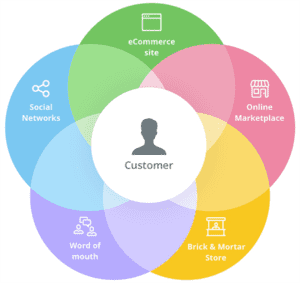Intro:
Omni-channel marketing is a sales approach that integrates all market touchpoints and channels to create a synergised and consistent brand experience for your prospective buyers both in the real world and online. This article outlines the role of signage in this crucial new marketing strategy and how this strategy is “driving” the automotive industry.
-
How Does Omni-Channel Marketing Work?
This means that if a buyer wants to purchase something from you they have multiple points to do so, be it online on a phone or computer, or over the phone or in your dealership. According to Emarsys*, this type of marketing is achieved when the customer experience is seamlessly integrated. The customer sees your signage and it reflects the same messaging and feels like the Facebook page and website. From there, the customer calls the dealer to book a test drive and receives a consistent level of positive customer experience throughout the test drive and into the closing.
Omni-channel customer experience strategies look at the process as a whole to align marketing efforts so each effort reinforces the next and works collectively. Hence the prefix, “Omni” is Latin and defined by the English dictionary as “combining form meaning”.
The goal of Omni-channel marketing is to tell a story throughout each touchpoint so that customers can build a relationship with the brand.

This illustration represents the way each channel flows and overlaps around the customer as the focus. The signage aspect of omnichannel marketing falls within the yellow section known as the “brick and mortar” store. Not every omnichannel marketing process will have a perfectly balanced approach. There is usually a dominant channel that is most relevant to the value offering. For the automotive retail industry and automotive sales, the two dominant channels would be Social media and of course brick and mortar (signage) because of the nature of the product. Although there may be dominant channels, each channel is equally as important because they support each other in the theory of omnichannel marketing.
Image Source: X-Cart
-
Why Omni-Channel Marketing Is Crucial To The Automotive Industry Today:
Deloitte* outlines omnichannel marketing as “the future of automotive retail”. Deloitte predicts the following based on changes in technology and consumer empowerment:
“Based on trends in other industries, Deloitte foresees a certain move towards omnichannel retail for automotive companies where customers will experience seamlessly integrated shopping, buying, and owning processes regardless of the channel in which they interact.” – The foundation of future automotive retail: Omni-channel customer engagement By Deloitte
Three drivers of this shift in the automotive industry’s marketing space according to Deloitte are the huge technological advances in communication and information that have empowered customers to seek out hundreds of possible options before making a purchasing decision. For the automotive industry, this is problematic because a consumer only buys a car approximately 2-10 times in their lifetime.
Omnichannel marketing is important to this industry, according to Deloitte because it interconnects the marketing efforts across all platforms in a way that take up a lot more digital space in the consumer’s mind through a meaningful customer experience that is consistent across touchpoints. This is the kind of marketing strategy that builds on itself to be bigger and more substantial so that it can push out some of the other digital clutter and minimise the possibility of potential buyers seeking out those hundreds of other options.
To read the full Deloitte study: Click here
-
What Role Does Signage Have To Play In Omni-Channel Marketing?
The brand signage and dealership fit-out are one of the crucially interconnected touchpoints with your customer. The important role that signage plays is that it has to fit a detailed set of specifications to remain consistent with the various other touchpoints. If one link in the “omnichannel” is broken then the return on marketing investment may be affected.
Signwriters need to achieve a very difficult and unique brand fit-out to make sure that the signage “link” of the omnichannel marketing efforts is good and strong. This requires project management experience with architects and fit-out specialists and the ability to deliver fully customised signage that can deliver on the unique brand requirements and specifications outlined by the omnichannel marketing and branding strategy. The signage specialist understands the importance of this and respects the work that went into developing this strategy by following the specifications with precision and without taking shortcuts.
-
Tips On How To Start Implementing Omni-Channel Marketing:
There is a multitude of integrated omnichannel marketing strategies and tactics. From a signage perspective, one of the omnichannel marketing strategies used is changing the format of the dealership. Customers and potential buyers these days expect the retail space or the dealership to be a real-world extension of what they have experienced through your online marketing efforts.
This can be done using large touch screens that assist the customer with viewing models and customising their vehicle with colours and upholstery finishes. We also recommend replacing the printed info sheet next to the displayed models with a tablet or iPad so that the customer can receive another iteration of your omnichannel marketing efforts. For VW we designed and fabricated these custom VW display stands that can house an iPad, so it is a relatively simple yet very effective solution.
Some other signage strategies include designing your signage with all the other touchpoints in mind. If your logo is displayed in a certain way on the website and social media then, as signwriters we try to replicate that on the side of the building using bespoke high-quality signage fabrication. We can also use the latest illuminated lightbox display technology that can be easily and cost-effectively changed out to display the latest promotions or whatever is currently being marketing online to ensure that the customer see the same promotions displayed in the dealership as they saw on their phone before deciding to visit the dealership.
References:
- Emarsys – The Differences Between Multichannel & Omnichannel Marketing
- Deloitte – The foundation of future automotive retail: Omni-channel customer engagement.




